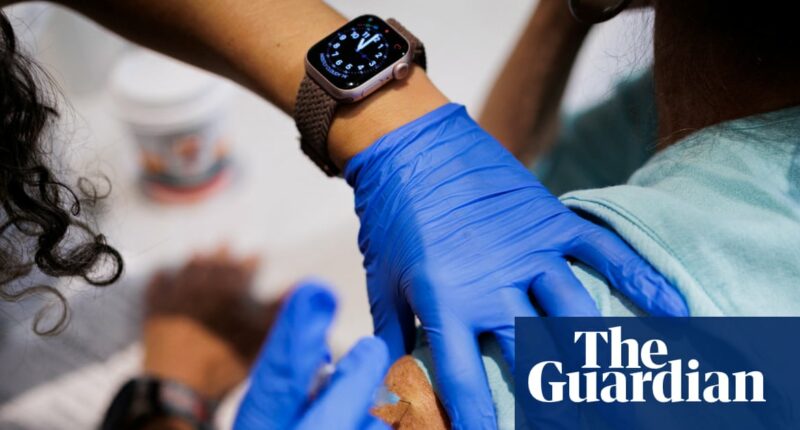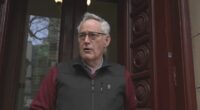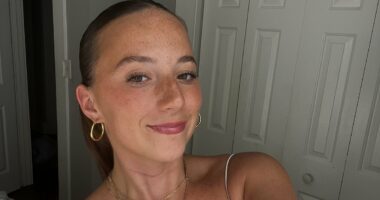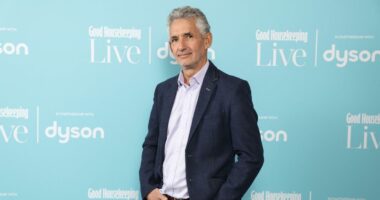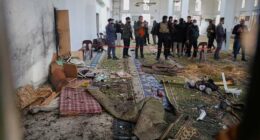Share this @internewscast.com
For many in the United States, the recent Covid vaccine directives by the US Food and Drug Administration (FDA), under the influence of health secretary Robert F Kennedy Jr and his contentious Make America Healthy Again (MAHA) campaign, have piled on stress in an already challenging healthcare environment.
The FDA approved Covid vaccinations for those aged 65 and older, who have a higher risk of severe illness from the virus, while younger individuals can only receive the vaccine if they have specific medical conditions that increase their vulnerability.
This fall and winter mark the first season where the US government has not broadly recommended Covid vaccinations, causing growing concern that aging or immunocompromised loved ones might be at risk.
Madison Heckel, a 33-year-old lawyer nearing her wedding day, feels the impact personally. She has faced recurrent illnesses ever since she first got Covid in 2021.
“Since then, I catch everything,” she noted, expressing frustration with her weakened immunity and doubting her eligibility for vaccine coverage under the new rules.
Her main concern is straightforward: avoiding illness on her wedding day. “Weddings are costly, and I’d like to prevent being sick that day if possible, so I just want the vaccine,” she commented. “I’ve gotten a booster shot every year.”
Yet the new rules have complicated what was once routine. Instead of stopping by CVS, as she has in past years, Heckel found herself on the phone with her insurer, navigating coverage questions and learning she’d need to go to a different pharmacy.
“I just am really hoping that I don’t have to risk being sick on my wedding day,” she said.
Though she was relieved to find out her vaccine would still be covered in some capacity, she’s still worried that her wedding – attended by people of all age groups – will likely host a significant number of guests who won’t be vaccinated. She doesn’t want anyone to get sick because they were there.
“I don’t know how many of the people who will be at my wedding are trying to get vaccinated, or how many qualify,” she said. “It just feels like it’s so much more complicated than it’s ever been before to get a vaccine.”
For 18-year-old student Zeke Fraser-Plant, the new guidelines heightened concerns he already carries daily. His parents and a close friend continue to live with long-term effects from contracting Covid: “My father has a lot of problems with brain fog. My mother loses her sense of smell completely. It comes back off and on.” His friend, who caught Covid as a teenager, struggles with memory.
Fraser-Plant’s his biggest fear has just been made stronger. “I’m absolutely terrified that I might kill somebody I know by bringing it home to them,” he said.
Unlike Heckel, Fraser-Plant does not automatically qualify for coverage. He and his family are prepared to pay out of pocket, even considering travel abroad. “It’s also a possibility that we might go out of the country to get the vaccine, if that becomes necessary,” he said.
But cost is only part of the concern. As he prepares to enter community college after a year of service with the Washington Conservation Corps, he worries about being surrounded by classmates who are now less likely to be vaccinated.
“With community college, I mean, it’s a total crapshoot,” he said. “I don’t think most people are going to take it well, if you just walk up and ask them about their vaccination status or how seriously they take Covid.”
His unease is understandable: his grandmother recently survived cancer, leaving her immune system fragile. He takes every precaution he can – masking, boosters, vigilance – but fears that there’s only so much he can do with an increasingly unvaccinated public.
“With the way vaccination rates are going, it’s just terrifying,” he said. “I just don’t know why more people don’t take these kinds of things seriously.”
Haley, a 40-year-old hairstylist from Portland, Oregon, is anxious about her job as someone who interacts with several people each day.
“I am a person in a public job that would prefer to be vaccinated to protect myself and others, and I don’t know if I’ll qualify now,” she said, adding that she feels that the current administration’s views on vaccines are “very, very dangerous”.
Roger, an emergency room physician from Alaska, said that healthcare decisions “should be based on scientific evidence, and not based on pseudoscientific ideology”. He says that he still witnesses many people die or become permanently disabled from Covid, and he’s afraid that those numbers are about to soar.
“I fear that as an emergency physician, I will see more unfortunate children and adults becoming ill and dying due to the lies propagated by this administration,” he said.
Elena, who is retired and living in Los Angeles, currently has stage 4 cancer and is on chemotherapy. Though she still qualifies for the vaccine, her 59-year-old husband apparently will not.
“Would my vaccination protect me if the person I live with gets sick? Possibly not,” she said. “And my chemo is incompatible with the only available treatment for Covid. It seems obvious that household members of immune-suppressed patients should also be eligible.”
Tammy Hansen, a 61-year-old librarian from Illinois, shares similar concerns of infecting a vulnerable loved one with the virus. She is about to become the caretaker for her 85-year-old mother following a major cancer surgery and ongoing chemotherapy.
“I want the vaccine so I can double protect her from getting Covid,” Hansen said. “My husband is 79 and I also worry about transmitting Covid to him.”
She added: “I swear if I get Covid and give it to my mom and she dies, I’ll be taking some kind of action. These fuckers are nuts.”
